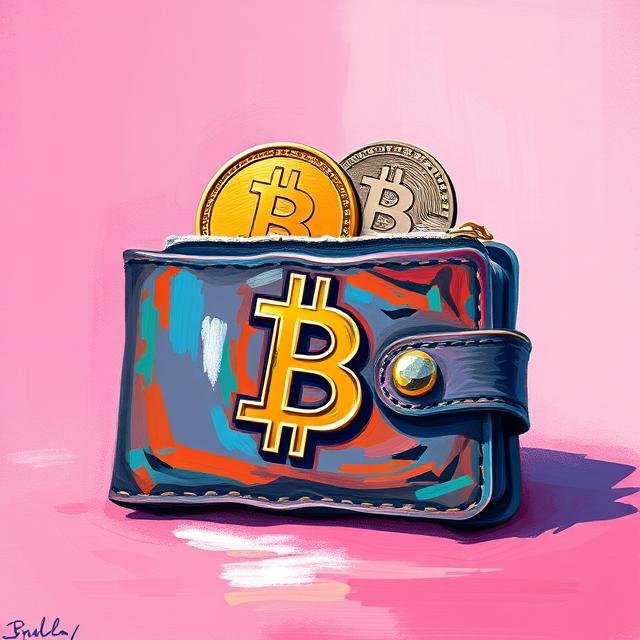The world of cryptocurrency is exciting and full of opportunity, but like any valuable frontier, it attracts its share of bad actors. Crypto wallet scams are becoming increasingly sophisticated, and knowing how to protect your digital assets is more crucial than ever in 2026. From clever phishing crypto schemes to fake apps, scammers are constantly devising new ways to try and part you from your hard-earned coins. This guide will break down the most common threats and provide actionable cryptocurrency security tips to help you stay safe.
- Why Crypto Wallets Are Prime Targets for Scammers
- The Usual Suspects: Common Crypto Wallet Scams to Watch Out For
- Red Flags: How to Spot Potential Crypto Wallet Scams
- Essential Wallet Backup Tips & Security Practices for
- What to Do If You Suspect You’ve Been Scammed
- Common Crypto Scams and How to Dodge Them: A Quick Table
- The Future of Crypto Wallet Security: What to Expect
- Final Thoughts: Staying Safe in the Crypto Frontier
- FAQs: Your Crypto Wallet Scam Questions Answered
- References
Why Crypto Wallets Are Prime Targets for Scammers
Crypto wallets are essentially the gatekeepers of your digital currency. They hold the private keys that give you access to your funds on the blockchain. If a scammer gets hold of these keys (or your seed phrase, which is like a master key), they can gain complete control of your crypto. The irreversible nature of most blockchain transactions means that once your crypto is gone, it’s usually gone for good.
The Growing Sophistication of Scams
Scammers are no longer just sending poorly worded emails. They use advanced social engineering schemes, create highly convincing fake websites and apps, and even leverage AI to make their crypto wallet scams more believable. Staying informed is your first line of defense.
Your Responsibility in a Decentralized World
With non-custodial wallets (where you control your own keys), the responsibility for security largely rests on your shoulders. This freedom is powerful, but it requires vigilance.
The Usual Suspects: Common Crypto Wallet Scams to Watch Out For
Knowledge is power when it comes to avoiding crypto wallet scams. Here are some of the most prevalent types:
Phishing Scams: The Art of Deception
Phishing remains one of the most common ways scammers try to steal your information. This involves tricking you into revealing sensitive data like your private keys, seed phrase, or login credentials.
- Fake Emails and Websites: Scammers create emails and websites that look almost identical to legitimate exchanges, wallet providers, or crypto projects. These often create a false sense of urgency (e.g., “Your account is compromised, click here to verify!”).
- Smishing (SMS Phishing) & Vishing (Voice Phishing): Scammers use text messages or phone calls, often impersonating support staff or security alerts, to get your info or direct you to malicious sites.
- How to avoid phishing crypto attempts: Always triple-check website URLs. Never click suspicious links in emails or messages. Access your accounts by typing the official URL directly into your browser or using a saved bookmark. No legitimate service will ever ask for your seed phrase or private keys.
Fake Wallet Apps and Software
Scammers create counterfeit versions of popular crypto wallet apps or desktop software.
- Where they appear: Unofficial app stores, direct download links from unverified sources, or even sometimes slipping through the cracks onto official stores (though usually removed quickly).
- How they work: Once installed, these fake crypto apps can steal your keys, redirect your transactions, or log your keystrokes.
- Prevention: Only download wallet software from official websites or trusted app stores (Google Play, Apple App Store). Verify the developer and check reviews.
Malware and Keyloggers: The Silent Thieves
Malicious software can infect your computer or mobile device to steal your crypto information.
- Keyloggers: Record everything you type, including passwords and seed phrases if you foolishly type them into a digital format.
- Clipboard Hijackers: When you copy a crypto address to send funds, this malware pastes the scammer’s address instead.
- Wallet Draining Malware: Some malware is specifically designed to detect and empty crypto wallets.
- Prevention: Use reputable antivirus software, keep your operating system and browser updated, avoid downloading suspicious files or clicking on dubious links, and never store your seed phrase digitally.
Social Engineering Schemes: Playing on Your Trust
Social engineering is about manipulating people into divulging confidential information or performing actions.
- Impersonation Scams: Scammers pose as tech support, exchange staff, or even friends/family on social media, Discord, or Telegram, offering to “help” with an issue but actually trying to get your seed phrase or remote access to your device.
- Romance Scams / “Pig Butchering”: Scammers build an online relationship over time, gain your trust, and then convince you to “invest” in a fraudulent crypto platform or send them crypto.
- Giveaway and Airdrop Scams: Scammers promise free crypto or NFTs if you send a small amount first, connect your wallet to a malicious site, or share your private keys. Real airdrops don’t require you to send crypto or give up your keys.
Malicious Smart Contracts and dApp Interactions
When interacting with Decentralized Finance (DeFi) protocols or Decentralized Applications (dApps), you grant permissions by signing transactions with your wallet.
- How it works: Malicious dApps or smart contracts can trick you into approving transactions that drain your wallet or give the scammer control over your tokens.
- Prevention: Only interact with reputable and audited dApps. Carefully review all transaction permissions before approving them. Be wary of new, unaudited projects promising unusually high returns.
Red Flags: How to Spot Potential Crypto Wallet Scams
Learning to recognize the warning signs is key to protecting digital assets.
- Urgency and Pressure: Scammers often try to rush you into making a decision or taking action (e.g., “Your account will be locked in 24 hours!”).
- Unsolicited Contact: Be wary of DMs, emails, or calls out of the blue, especially if they ask for information or money.
- Too Good to Be True Offers: Promises of guaranteed high returns, free money, or doubling your crypto are almost always scams.
- Requests for Seed Phrase or Private Keys: NO ONE legitimate will ever ask for these. They are for your eyes only.
- Poor Grammar and Spelling: While scammers are getting better, unprofessional language can still be a red flag.
- Slightly Off URLs or Email Addresses: Look for subtle differences from official sites (e.g.,
coinbaze.cominstead ofcoinbase.com).
Essential Wallet Backup Tips & Security Practices for 2026
These crypto security best practices are your best defense against common wallet scams.
Protecting Your Seed Phrase (Recovery Phrase) Like a Dragon Guards Gold
- Write It Down Offline: Use pen and paper. Make multiple copies.
- Store Securely & Separately: Think fireproof safes, safety deposit boxes (consider access implications), or trusted (but separate) locations. Metal seed phrase storage offers excellent durability.
- NEVER Digitalize It: No photos, no text files, no cloud storage, no password managers for your seed phrase.
- NEVER Share It: Period.
Using Strong, Unique Passwords and Two-Factor Authentication (2FA)
- Use complex, unique passwords for every crypto exchange and wallet account.
- Enable 2FA (preferably using an authenticator app, not just SMS) wherever possible. This is a vital step to avoid phishing crypto attacks.
Choosing and Using Wallets Wisely
- Download from Official Sources Only: Double-check URLs (e.g.,
metamask.io,ledger.com,trezor.io). - Consider a Hardware Wallet (Cold Storage): For significant amounts of crypto, a hardware wallet keeps your private keys completely offline, offering superior protection. This is one of the best cryptocurrency security measures.
- Keep Software Updated: Regularly update your wallet software, browser, and operating system.
Vigilance in Transactions and dApp Interactions
- Verify Wallet Addresses: When sending crypto, always double or triple-check the recipient address. A clipboard hijacker malware can change it without you noticing. Send a small test transaction first for large amounts.
- Be Cautious with Smart Contract Approvals: Understand what permissions you are granting when interacting with dApps. Revoke unnecessary approvals using tools like Etherscan’s Token Approval Checker.
What to Do If You Suspect You’ve Been Scammed
If you think your crypto wallet has been compromised:
- Act Fast: If possible, try to move any remaining funds to a new, secure wallet that you know is safe (with a new seed phrase).
- Do NOT Send More Money: Scammers often try to trick victims into sending more funds for “taxes” or “fees” to release their “winnings” or “locked assets.
- Report the Scam: Report it to the relevant crypto exchange (if involved), law enforcement agencies (like the FBI’s IC3 in the US), and consumer protection bodies.
- Warn Others: Share your experience (anonymously if needed) in crypto communities to help others avoid the same scam.
Common Crypto Scams and How to Dodge Them: A Quick Table
| Scam Type | How It Works | Key Prevention Tip |
|---|---|---|
| Phishing (Email/Website) | Fake login pages or alerts to steal credentials/seed phrase. | Always verify URLs; never click suspicious links; never enter seed phrase online. |
| Fake Wallet Apps | Malicious apps mimicking real wallets to steal keys/funds. | Download ONLY from official app stores and official wallet websites. |
| Malware/Keyloggers | Software that steals typed info or hijacks clipboard for addresses. | Use good antivirus; avoid suspicious downloads; never type seed phrase. |
| Social Engineering (Impersonation) | Scammers pose as support/friends to get your seed phrase or access. | Never share your seed phrase; be skeptical of unsolicited help. |
| Giveaway/Airdrop Scams | Promise free crypto for sending some first or connecting wallet to bad site. | Real airdrops don’t require sending crypto or your seed phrase. |
| Malicious Smart Contract | Tricking you into approving a contract that drains your wallet. | Only interact with reputable, audited dApps; review permissions carefully. |
The Future of Crypto Wallet Security: What to Expect
As the crypto space matures, expect to see ongoing advancements in wallet security, including:
- More sophisticated multi-factor authentication methods.
- Improved smart contract auditing and security standards.
- Better user education initiatives from legitimate wallet providers and exchanges.
- Potential for AI-powered scam detection tools (though AI is also used by scammers).
However, personal vigilance will always remain the most crucial element.
Final Thoughts: Staying Safe in the Crypto Frontier
Navigating the world of cryptocurrency requires a proactive approach to security. Crypto wallet scams are unfortunately a reality, but by understanding common tactics, learning how to avoid phishing crypto attempts, and diligently applying crypto security best practices – especially around protecting your seed phrase – you can significantly reduce your risk. Stay informed, stay skeptical of unsolicited offers, and always prioritize the safety of your digital assets.
FAQs: Your Crypto Wallet Scam Questions Answered
What is the most common type of crypto wallet scam to watch out for in 2025?
Will a hardware wallet protect me from all crypto scams?
How can I tell if a crypto wallet app is fake?
What should I do if someone online asks for my crypto seed phrase or private keys?
Are 'free crypto giveaways' or 'airdrops' always scams?
References
- Federal Trade Commission (FTC). (n.d.). Crypto Scams. Retrieved from https://consumer.ftc.gov/articles/crypto-scams
- Securities and Exchange Commission (SEC). (n.d.). Investor Alert: Watch Out for Fake Digital Wallet Scams. Retrieved from https://www.sec.gov/oiea/investor-alerts-and-bulletins/digital-wallet-scams-investor-alert
- CISA (Cybersecurity & Infrastructure Security Agency). (n.d.). Avoiding Social Engineering and Phishing Attacks. Retrieved from https://www.cisa.gov/news-events/news/avoiding-social-engineering-and-phishing-attacks
- Coinbase Learn. (n.d.). How to Spot and Avoid Common Crypto Scams. Retrieved from https://www.coinbase.com/learn/crypto-basics/common-crypto-scams
- Binance Academy. (n.d.). Common Scams on Mobile Devices. Retrieved from https://academy.binance.com/en/articles/common-scams-on-mobile-devices
- Trust Wallet Blog. (2025, April 24). How to Spot and Avoid Crypto Wallet Scams in 2025. Retrieved from https://trustwallet.com/blog/security/how-to-spot-and-avoid-crypto-wallet-scams-in-2025










